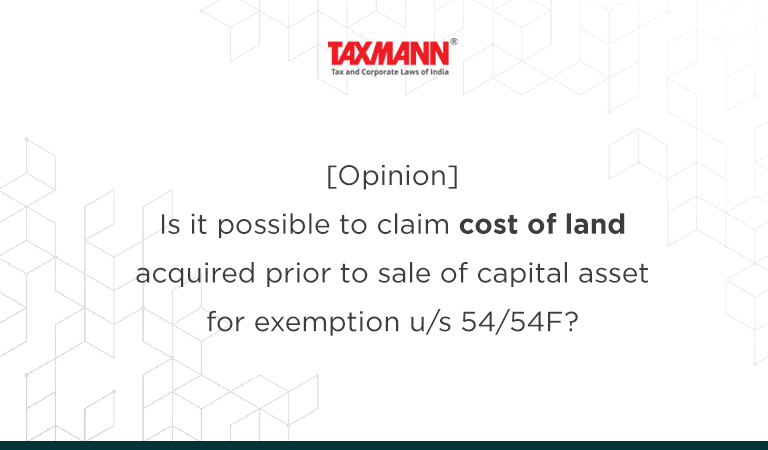[Opinion] Is it possible to claim cost of land acquired prior to sale of capital asset for exemption u/s 54/54F?
- Blog|News|Income Tax|
- 3 Min Read
- By Taxmann
- |
- Last Updated on 23 January, 2023

It may surprise that capital gain was not an income and that was the tax philosophy under the Income-tax Act up to the year 1947. It was subjected to income-tax in the year 1947 and was abolished w.e.f. 01.04.1949 before it was reintroduced by the then Finance Minister T.T.Krishnamachari w.e.f. 01.04.1950. Even now a layman may question the taxation of capital gain as income and probably to avoid having yet another piece of legislation for taxing the gains on capital transactions, the taxation of capital gains got accommodated in the income-tax law itself.
While the taxation of any income is not free from controversy, the taxation of capital gains is perhaps the most controversial domestic taxation arena for the reason that the real income is not subjected to tax under this head. The income by way of capital gain is computed by applying some deeming fictions and hence the controversy in appreciating/interpreting those deeming fictions.
This refresher takes note of the fact that the exemption for capital gains is to be computed by including the cost of land as well. The CBDT Circular No.667 dated 18.10.1993 also supports such thought. However, the human tendency is not to accept what is given as benevolent provision but seek something more and thus the taxpayers claim that cost of land acquired much before the accrual of capital gain is also to be allowed the tax benefit while computing the exemption under sections 54/54F. Such thought process is not unjustified and there exists a legal decision in the case of Sohanlal Mohanlal Bhandari v. Asstt. CIT [2019] 104 taxmann.com 161 (Pune-Trib.).
Sohanlal Mohanlal Bhandari’s case
The assessee transferred a plot of land in the financial year 2012-13 which resulted in a long-term capital gain of Rs.97.47 lakhs. The assessee claimed exemption under section 54F by including the cost of plot (on which residential building was put up for availing the exemption under section 54F) though it was acquired prior to the sale of the plot from which the capital gain had arisen.
The Assessing Officer found that the assessee had claimed the cost of plot being Rs.44.15 lakhs which was acquired prior to the date of sale of capital asset (incidentally another plot) for which exemption was sought. The Assessing Officer held that the acquisition of land prior to the date of transfer of capital asset (plot) could not be considered as qualifying amount for the purpose of computing the exemption under section 54F. As against the exemption claim of Rs.87.73 lakhs on investment of Rs.112.93 lakhs, the Assessing Officer allowed exemption only on the cost of construction being Rs.67.60 lakhs (and denied the benefit to the extent of Rs. 44.15 lakhs).
Factually, the assessee acquired the plot of land in which the new capital asset (residential building) was constructed about a year ago before the date of transfer of yet another vacant land whose sale qualified for exemption under section 54F. The land in which the residential house was put up was acquired on various occasions and the first acquisition was on 11.01.2010 and the balance on various dates in the financial year 2011-12.
The CIT (Appeals) restricted the disallowance of the cost of land which was acquired on 11.10.2010 being more than one year before the date of transfer of the long-term capital asset. Thus, the claim of exemption was partly allowed/disallowed in the first appeal.
The controversy before the tribunal is whether the assessee is entitled to exemption under section 54F even in respect of land acquired one year before the date of transfer of long-term capital asset? Note: The date of sale of land was on 11.06.2012 and the date of first purchase of land was 11.10.2010 for which exemption was claimed.
Click Here To Read The Full Article
Disclaimer: The content/information published on the website is only for general information of the user and shall not be construed as legal advice. While the Taxmann has exercised reasonable efforts to ensure the veracity of information/content published, Taxmann shall be under no liability in any manner whatsoever for incorrect information, if any.

Taxmann Publications has a dedicated in-house Research & Editorial Team. This team consists of a team of Chartered Accountants, Company Secretaries, and Lawyers. This team works under the guidance and supervision of editor-in-chief Mr Rakesh Bhargava.
The Research and Editorial Team is responsible for developing reliable and accurate content for the readers. The team follows the six-sigma approach to achieve the benchmark of zero error in its publications and research platforms. The team ensures that the following publication guidelines are thoroughly followed while developing the content:
- The statutory material is obtained only from the authorized and reliable sources
- All the latest developments in the judicial and legislative fields are covered
- Prepare the analytical write-ups on current, controversial, and important issues to help the readers to understand the concept and its implications
- Every content published by Taxmann is complete, accurate and lucid
- All evidence-based statements are supported with proper reference to Section, Circular No., Notification No. or citations
- The golden rules of grammar, style and consistency are thoroughly followed
- Font and size that’s easy to read and remain consistent across all imprint and digital publications are applied



 CA | CS | CMA
CA | CS | CMA
